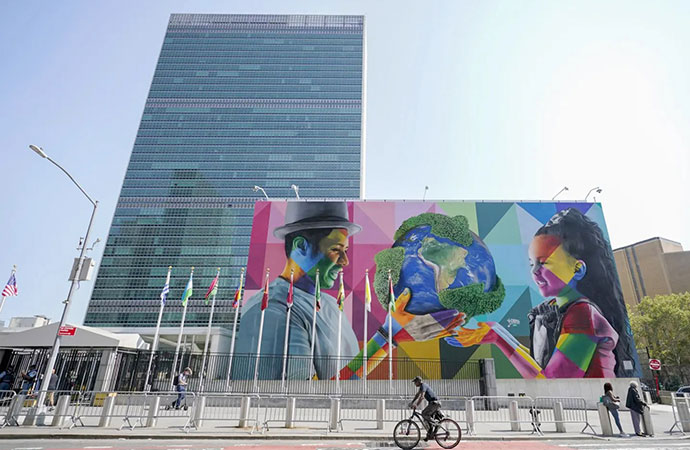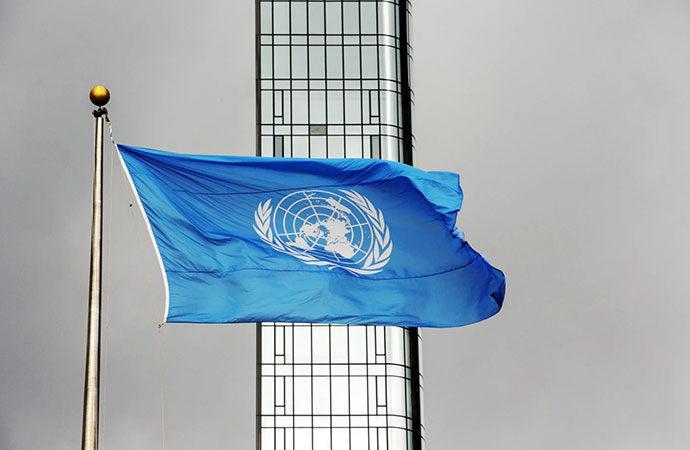Politics

Photo: AP/UNB
While the demand for what the United Nations does is as great as ever, its ability to deliver has obviously been diminished. There is no way for it to survive without scaling back its ambitions and abilities, and that, in turn, may require a move to a more hospitable country.
The annual United Nations General Assembly is always an occasion for taking stock of the state of the world. But this year, on the 80th anniversary of the UN's founding, it was also an occasion to take stock of the organization itself.
By any measure, the UN's situation is dire. While Russian aggression against Ukraine and mounting tensions between the United States and China cannot be blamed on the UN, they do highlight a fundamental problem. The UN Security Council - where China, Russia, and the US each wield a veto - is locked in a permanent confrontation over one issue or another, blocking the rest of the organization from moving forward on almost anything.
Consider the situation in the Middle East, where the UN has played a central role in conflict resolution and peacemaking ever since the State of Israel was established (under a UN resolution). Numerous UN peacekeeping operations in the region have helped to alleviate tensions, and massive humanitarian efforts, primarily aimed at Palestinian refugee communities, have saved countless lives. While the UN has not forged a lasting peace, it has certainly helped prevent some wars and shorten others.
In recent years, however, the UN has increasingly been sidelined. The so-called Quartet - the UN, the US, the European Union, and Russia - is now a distant memory, and numerous UN operations have come under direct attack, primarily by Israel. The Israeli government not only questions the humanitarian efforts of UNRWA (the UN Relief and Works Agency for Palestine Refugees) but now also blocks the organization's work whenever it can.
Before Hamas's October 7, 2023, attack on Israel, the UN was essential to keeping the situation in Gaza relatively stable. Though it couldn't overcome divisions among the Palestinians, especially after Hamas assumed power in Gaza in 2006, it could, and did, help provide the basic means of survival for the enclave's two million people. But now Israel has questioned or attacked virtually every aspect of the UN's work on this issue, and it could not have done so without America's tacit support. US President Donald Trump, in particular, has proved willing to accept virtually everything that Israeli Prime Minister Binyamin Netanyahu's extremist government does.
Meanwhile, the UN has struggled to mobilize an effective response in South Sudan, a semi-failed state, and in Sudan, where a devastating civil war is entering its third year. Similarly, from the Katanga secession in 1960-63 to the recent peace operations in northeastern Congo, Central Africa continues to preoccupy UN peacekeepers and mediators.
Around the world, there is no shortage of crises that demand UN engagement - from Gaza and Sudan to the Democratic Republic of the Congo, Haiti, Myanmar, and Afghanistan, to name just a few. But with the larger powers fixated on their confrontations with one another, and with the Trump administration withdrawing not only active support but also funding, the outlook for the UN appears grim.
The US provides 25% of UN funding, but it has stopped sending its contributions. It also traditionally accounts for an even larger share of voluntary financing for humanitarian operations, but these funds, too, have been cut. Making matters worse, China, the UN's second-largest contributor, is also behind on its payments.
With its financial situation growing desperate, UN Secretary-General António Guterres warns that staff across the organization will need to be cut by one-fifth. Morale is said to be low, as is the prospect of a change for the better. With his recent address to the General Assembly, Trump made clear that he has nothing but contempt for the organization. The only role he seems able to see for it is to help him get a Nobel Peace Prize. The Trump administration's forthcoming review of America's multilateral commitments is almost certain to deliver more bad news.
Does the UN have any future? While the demand for it is as great as ever, its ability to deliver has obviously been diminished. There is no way for it to survive without scaling back its ambitions and abilities; precisely how it goes about this will be a central issue over the next few years.
With Guterres's tenure ending in 2026, the process of selecting his successor will also have to feature a debate about ensuring the UN's long-term survival. Moving the headquarters out of the US is a natural step, owing not only to the withdrawal of US funding and the need for cost savings, but also to the US refusal to grant visas to those attending UN gatherings (as it did with the Palestinian leadership this year).
Yes, a UN that is no longer headquartered in New York would be different in many ways. But relocation also may be the only way for it to survive. Dag Hammarskjöld, the UN's second secretary-general, famously remarked that the body was not created to deliver Heaven, but rather to spare us from Hell. That task remains as important as ever. But for things to stay the same, everything must change.
From Project Syndicate

























Leave a Comment
Recent Posts
Religion and Politics: A Toxic ...
At Dhaka University, cafeteria workers have been told not to wear shor ...
Enayetullah Khan joins AsiaNet ...
AsiaNet’s annual board meeting and forum was held in Singapore, ...
In a New York minute
Many leaders back a UN call to address challenges to ..
Defaulted loans at Non-Bank Financial Institutions ( ..
How the late Zubeen Garg embodied cultural affinitie ..